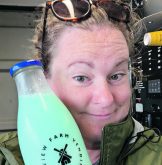Former farm leader and municipal politician enjoys giving up past responsibilities: ‘for once, I am in control of the day’
CALGARY — The move from an acreage near the tiny hamlet of Kelsey in central Alberta with a population of 12 to the sprawling city of Calgary with more than a million people has brought big change, but a good change, says former farmer and municipal councillor Don Gregorwich.
“In Calgary, there are a lot of opportunities here: museums, theatres and high-speed internet. And high-speed internet opens up a whole new world right there.”
While COVID-19 has changed retirement plans for Gregorwich and his wife, Joan, it has also allowed the couple to take time to explore southern Alberta and set their own schedule.
Read Also

Nutritious pork packed with vitamins, essential minerals
Recipes for pork
“We were able to get in the car and go for a day’s drive and see areas of southern Alberta that we only drove by at 60 m.p.h. (100 km-h). That has been an excellent thing for our mental health. We always liked to go to the mountains but could only do that once a year,” said Gregorwich.
Retirement for the farmer and Camrose County councillor and reeve also means the day is filled with activities set by the couple, not the seasons, the farm or council meetings.
“When we left behind the farm, there were a lot of responsibilities that disappeared from cutting the grass and things that go along with owning property. We have become renters in Calgary. Moving from owning to renting has been a good experience. The responsibilities have gone and allowed you to do other things,” said Gregorwich, who moved to Calgary eight months earlier.
“For once, I am in control of the day. The activities and the responsibilities I have don’t control me the way they did in the past.”
Like most leaders, responsibilities are added gradually over the years. Gregorwich went from a teaching career to a “decent-sized” hog and grain operation on the family farm. It was while farming that he was asked to be the hog producer representative on the Crow Rate Offset committee. It was a committee to ensure farmers were compensated fairly for the end of the historic Crowsnest Freight Rate, a transportation benefit designed to keep shipping costs down.
“I didn’t want to sit on this committee, but they said it will only be three months and then the federal government will cave in and give Alberta the Crow Rate fund. I sat on that committee for nine years and 10 months.”
During that time, Gregorwich was exposed to new people and organizations. He worked as a facilitator for the Environmental Farm Plan and did some work for Alberta Barley and Alberta Pulse Growers. It also became obvious during this time that he couldn’t continue to work full time in the hog operation.
“After some serious thought I closed the hog operation and rented out the land and the other things seemed to flow in.”
Shortly after, he was elected councillor in Camrose County. He spent 16 years on council, 12 as reeve.
“Those changes all came together to make me realize transition is a good thing and you need the attitude to keep on learning.”
Gregorwich took advantage of the courses offered by the provincial government’s department of municipal affairs and by the Rural Municipalities Association, the umbrella organization for the province’s counties and municipalities. He took courses on budgeting, policy making, dealing with environmental issues and dozens of others offered over the years.
“Every time you turned around there was something new to read. In the whole municipal government process there is a lot of opportunity for contact with people in the same boat. You develop a network of fellow councillors you can pick up the phone and talk with. It takes a lot of effort, way more than what people think it takes, to be a municipal councillor,” he said.
“It is the most important part of government. My MP can get on a plane and head off to Ottawa. My MLA can go hide out in caucus in Edmonton, but I am the guy that is just down the road.”
Gregorwich jokes the most asked question he received as councillor was: “Have you driven down my road lately?”
“That can be a question or a demonstrative statement. Too often all of us look at what is in our own little world and we don’t realize what it takes to keep the system going that we use.”
Gregorwich said being an effective county councillor took a holistic approach to government. Having a good understanding of land use planning, public works, fire services, libraries, social services and gravel roads is the key to making a county succeed.
Years ago the county looked at its high natural gas bill and installed an environmentally friendly heating system, fueled by willow trees grown on county land.
“Environmentally, it was years ahead of its time.”
The county also transformed an abandoned gravel pit into the Nature Conservation Centre to promote nature and offer residents a location to boat, picnic, swim and bird-watch.
“Normally gravel pits were left to be eyesores. We made that into a really enjoyable site for people of all ages to come to.”
The high-quality staff at the county was a testament to its stability and the strong group of councillors and staff, he said.
“There was and is a terrific amount of talent there and we attracted new talent to come and work for Camrose County. That is a sign that things are being done right. When I look back at fellow councillors, without exception, they were really a talented group of people.”
The county was also one of the first across Canada to promote local food and local food producers in the area.
While COVID-19 restrictions are easing, Gregorwich will be settling down to his computer to write a book about his time on county council.
“I saved every day-timer that I’ve had since I started as councillor. As I went along I would make notes and then after a couple years if I got a phone call I made a note of the caller and the date and time and what they talked about,” he said.
“The transition from going from 60 m.p.h. to 10 really wasn’t difficult. I try to continue learning. You have to learn until our very last day and every last experience was something new to learn and that is exciting.”

















